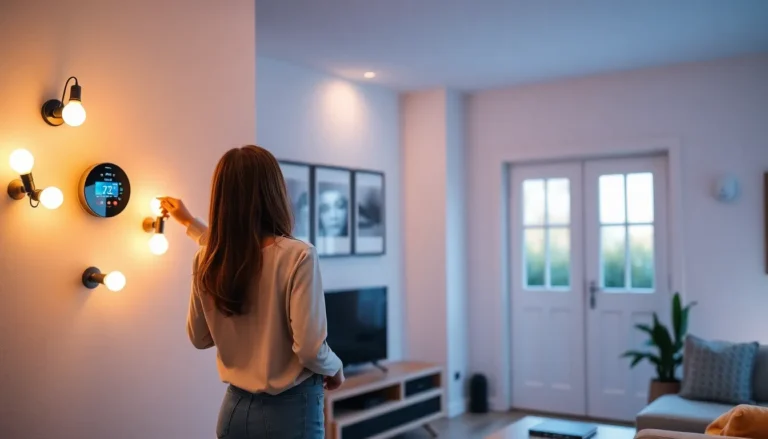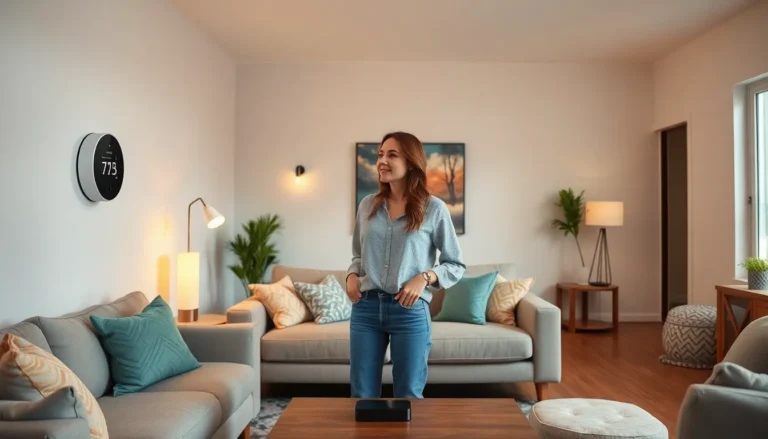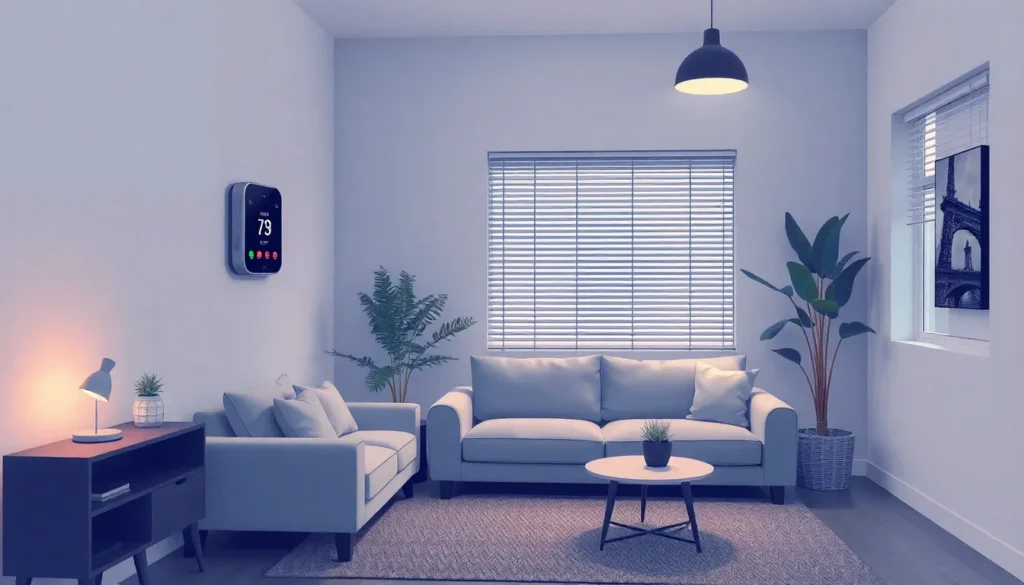Table of Contents
ToggleThe future of home living is knocking at the door, and it’s not just your overly enthusiastic neighbor. Home automation is transforming everyday spaces into smart havens, making life easier, and maybe a little more entertaining. Imagine controlling your lights, thermostat, and even your coffee maker with a simple voice command—no more stumbling around in the dark or waiting for that morning brew to kick in.
As technology evolves, so does the world of home automation. New gadgets and systems are popping up faster than you can say “smart home.” From quirky devices that make you wonder why you ever lived without them to essential upgrades that save you time and energy, there’s a lot to unpack. Buckle up as we dive into the latest trends, innovations, and news that’ll make your home not just smart, but downright genius.
Latest Trends in Home Automation News
Home automation continues to shape everyday living. The focus centers on convenience and efficiency, with new trends emerging rapidly.
Smart Home Devices
Smart home devices lead the charge in home automation advancements. Products like smart speakers, security cameras, and smart thermostats make homes more interactive. Voice-activated assistants streamline daily tasks and enhance user control. Energy-efficient smart appliances reduce consumption and cut utility costs. Consumers increasingly adopt smart lightings, such as LED bulbs, that can be scheduled or dimmed remotely. Brands like Google, Amazon, and Apple contribute significantly to this evolving landscape, each introducing innovative features that enhance user experience.
Integration with IoT
Integration with the Internet of Things (IoT) significantly transforms home automation. Devices interconnected through IoT create seamless communication, allowing users to control multiple systems from a single interface. Home security systems can send alerts via smartphones, while smart refrigerators can notify when groceries are low. This integration fosters advancements in data analytics, giving homeowners insight into usage patterns. Consequently, users can optimize their energy consumption based on real-time feedback. Home automation becomes even smarter as IoT technology evolves, paving the way for more sophisticated home management solutions.
Industry Updates

Recent advancements continue to shape the landscape of home automation. Innovations stem from major companies making strides in technology and new products enhancing everyday living.
Major Companies in Home Automation
Amazon, Google, and Apple lead the charge in home automation. Their platforms, like Alexa, Google Assistant, and Siri, streamline device connectivity and control. Samsung and Philips also play significant roles with their SmartThings and Hue systems. Each company prioritizes user experience, integrating voice commands and smart sensors into devices. These technological advancements aim to create seamless interactions within smart homes. Furthermore, smaller companies are emerging, introducing niche smart products that cater to specific needs, thus diversifying the market.
New Product Releases
New devices consistently hit the market, reflecting the industry’s growth. For instance, smart thermostats now offer advanced energy-saving features, allowing users to monitor consumption remotely. Security cameras equipped with AI recognize familiar faces, enhancing home safety. Additionally, smart lighting solutions provide customizable settings, adapting to users’ preferences throughout the day. Recently, smart smoke detectors capable of sending alerts to smartphones have gained popularity, reinforcing safety measures in homes. Highlights also include smart kitchen appliances that integrate cooking tutorials and grocery list management, simplifying meal preparation. Each release contributes to a future where convenience and efficiency coexist.
Innovations Shaping the Future
Home automation continues to evolve, introducing groundbreaking technologies that redefine living spaces. Smart devices increasingly rely on AI and machine learning to enhance user experience.
AI and Machine Learning
AI and machine learning drive automation by enabling devices to learn from user habits. Sensors collect data, allowing systems to predict when to adjust lighting or temperature based on patterns. These intelligent devices offer personalized experiences, adjusting settings to individual preferences. Security cameras equipped with AI can identify familiar faces, increasing home safety. As data analytics improve, automated systems provide real-time insights, optimizing energy use and functionality. Major companies lead the charge, creating devices that adapt to the behaviors of their users.
Sustainable Home Solutions
Sustainability plays a crucial role in home automation innovations. Energy-efficient smart appliances, such as refrigerators, reduce waste while enhancing convenience. Solar-powered devices offer eco-friendly alternatives, allowing homeowners to harness renewable energy. Smart thermostats coordinate with heating systems to minimize energy consumption and lower utility bills. Automated irrigation systems optimize water usage for gardens and lawns, promoting sustainable landscaping practices. These advancements align technology with environmental responsibility, appealing to homeowners focused on reducing their carbon footprint. The market’s shift toward these solutions showcases a commitment to a greener future.
Consumer Insights
Consumer preferences are rapidly evolving in the realm of home automation. Data shows a significant shift towards smart home technology, reflecting increased interest and investment among homeowners.
User Adoption Rates
Current statistics reveal that approximately 38% of US households own at least one smart device. Many consumers embrace voice-activated speakers, with usage rates soaring to 27%, making them popular choices. Adoption isn’t limited to tech-savvy individuals; increasing numbers of older adults incorporate smart appliances into their homes for added convenience. This steady growth reflects a broader trend toward integrating home automation into daily life. Most consumers prioritize energy efficiency and user-friendly features when selecting devices, leading to anticipated increases in smart home appliance ownership over the next few years.
Common Challenges Faced
Despite the growing interest, several challenges hinder widespread adoption of home automation. Security concerns rank high on the list; many consumers worry about potential cyber threats associated with interconnected devices. Installation complexity also poses a barrier; some individuals find setting up smart systems daunting, particularly those without technical expertise. Compatibility issues between brands can complicate user experiences further, leading to frustration. Limited awareness of the benefits and functionalities of smart devices prevents potential users from taking the leap. Companies that address these challenges may pave the way for enhanced consumer trust and broader market acceptance.
The landscape of home automation is rapidly evolving and offers exciting possibilities for enhancing daily life. As technology continues to advance smart devices are becoming more intuitive and user-friendly. This transformation not only improves convenience but also promotes sustainability through energy-efficient solutions.
With major players and innovative startups driving the market there’s no shortage of options for homeowners looking to embrace smart technology. The integration of AI and IoT further enriches these experiences making homes more responsive to individual needs.
As awareness grows and challenges are addressed the future of home automation looks promising. Homeowners can look forward to a smarter more efficient lifestyle that aligns with modern demands and environmental consciousness.







